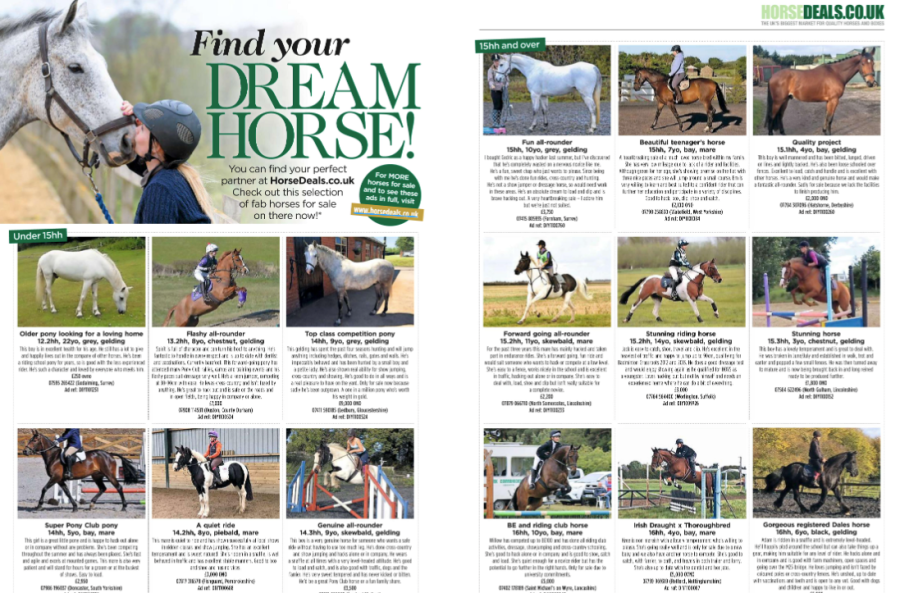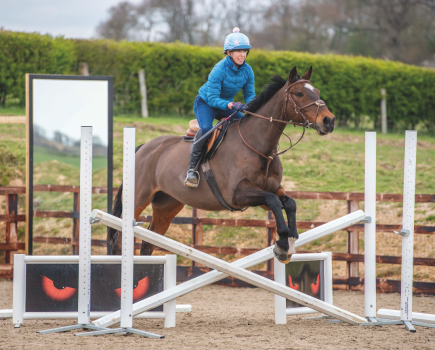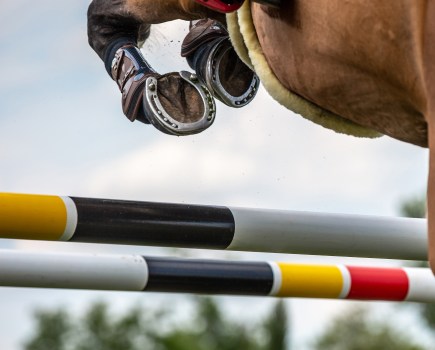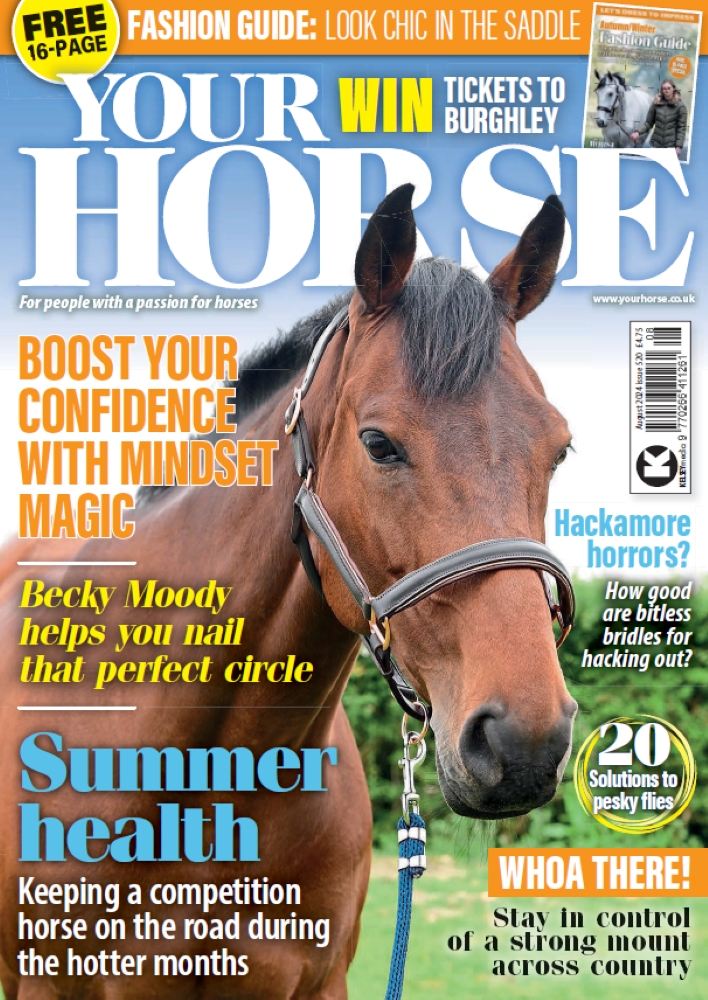Sifting through horses for sale ads in a quest to buy a new horse is an exciting but enormous task. There is so much to think about, including what tack and gear you’re going to need, but it begins with knowing where to look for horses for sale. Whether you’re on the lookout for a new cob, ex-racehorse or you need an all-rounder or something more specific, there are several ways to find the perfect equine companion.
Once you’ve decided what your non-negotiables are — these are key characteristics such as maximum price, height, age or experience of your future horse — it’s time to start looking. Your rights as a purchaser vary, depending on whether you buy a horse from a private seller or a dealer, so make sure you’re aware of these before you begin your search. You might also consider looking for a horse or pony on loan or to share with another rider. Your Horse has put together the following handy list to explain the best places to find a horse for sale.
1 Social media
Social media is filled with horses for sale posts. Private sellers share ads in specific equestrian groups, while dealers and professional riders often advertise horses on their business page. You’ll likely see friends sharing posts about their own horses for sale showing up in your news feed too. Similarly, there are ‘horses wanted’ groups and you can also share your own post about what sort of horse you’re looking for, in case one of your connections has, or knows of, something suitable.
Social media is a popular place to advertise horses for sale. There are no shortage of ads to browse through and they will each give you a snapshot into the horse they are selling. It is easy to immediately message sellers, and it’s free to advertise. In fact, there are so many for sale ads that you won’t be able to see and read them all. Bear in mind, too, that it is against some social media sites policies to sell animals or livestock via their platforms. Facebook, for instance, has banned for sale ads and will take action, such as suspending a user’s account, against those who do. As a result, sellers use clever language and emojis in an ad — carrots instead of zeros to indicate a price, for example.
2 Websites
There are plenty of dedicated horses for sale websites, including Horsemart, Horse Quest, Whikr, Right Horse Right Home and Pets4Homes. Websites like these often make it easier to narrow down what ads you see as you can filter by location or characteristics, such as horse height, age, breed, experience or discipline. This makes it quicker and easier to rule out horses who won’t be suitable.
The downside to this is you’re going in blind. By this, we mean you might travel many miles to see a horse who is being sold by a person you don’t know, and whose reputation you’re unaware of. Always take a horsey friend with you, for safety and also to offer their advice as a second pair of eyes.
3 Word of mouth
Many nice horses for sale never get advertised as they are snapped up before an ad is needed, as a prospective buyer has heard they are for sale on the grape vine. This is a great way to buy a horse. You’ll either know the horse already or have seen it out and about locally, or you’ll know someone you does — and you trust their opinion on the horse to be accurate and trustworthy.
If you’re already plugged into your local equestrian community, put the word out that you’re looking for a new horse. You can speak to friends or fellow liveries and Pony Club or riding club members. It could even be worth chatting to professionals such as your vet, farrier or physio, as they regularly visit local yards and so may come across the perfect horse for you. Buying from someone you know, or someone a good friend knows, means you can be confident you’ve found an honest seller, too.
4 Magazines and papers
Once upon a time, the back of a horsey magazine and printed classified ads were a prime place to advertise and find horses for sale. The internet and social media has made printed classifieds almost a thing of the past, but a few equestrian publications still include a few pages at the back of their magazine. It’s worth a quick flick through next time you pick up a copy.
5 Tack shops
A few sellers are still old school, and would rather sell their horse locally, particularly if they are selling something low level or a happy hacker. Next time you’re doing your horsey shopping, see if they have a customer notice board. They probably do, and there’s likely to be several horses for sale adverts pinned to it.
6 Auction
Horse auctions are another traditional way of selling and buying horses. Ascot racecourse is the site of a regular ex-racehorse auction, for example, and your local cattle market probably holds an equine market too. These aren’t for inexperienced buyers, as you buy what you see in the ring — there’s little time to view the horse beforehand — and you don’t truly know what you’re buying, until you get home. That said, there are also elite sport horse auctions, where horses can be viewed and tried under saddle. These horses often go for the big bucks, so do your homework.
Auctions run in person and online. At some, particularly on the continent, you can even choose to ride a couple of lots to see how you like them rather than bidding blind. There are auctions for every kind of horse. It’s essential that you know the risks of buying at auction, but many people navigate these successfully.
7 Rehoming from a charity
Fostering or adopting a horse from a charity is a rewarding way to acquire a new horse. You’re also freeing up a stable for a new horse to be rescued too. Prospective owners have to complete a process before being approved to rehome a horse, including visiting and trying the horse and a charity official visiting you to inspect your yard. This takes longer than buying a horse privately, but it comes with many benefits.
By rehoming, you are providing a home for a horse or pony who has had a difficult or traumatic life. Every equine is fully assessed and their adverts are honest and thorough, so there’s no chance of being mis-sold a horse. Should anything happen down the line and your circumstances change, most charities will take back the horse. Ownership remains with the charity, to prevent the horse being sold on.
The bigger charities that advertise horses for rehoming include RSPCA, World Horse Welfare, Blue Cross, Bransby Horses, and Redwings. There are also charities specifically for re-homing ex-racehorses, including HEROS and Racehorse Rehoming Centre.
Bear in mind that a lot of rescue horses are only suitable to be rehomed as companions. If it’s a ridden horse you’re looking for, it might take longer but it’s worth the wait. Register your details with charities and they’ll alert you when something suitable is available.
8 Post your own wanted ad
Adverts also take the form of ‘wanted’ ads. Be proactive and post a wanted ad in all of the places we’ve discussed above. Be specific (but realistic) about what you’re looking for and what your budget is. Sellers can then get in touch with you if they think they have something suitable. Good luck in your search — happy horse hunting!
Main image by Your Horse/Kelsey Media








